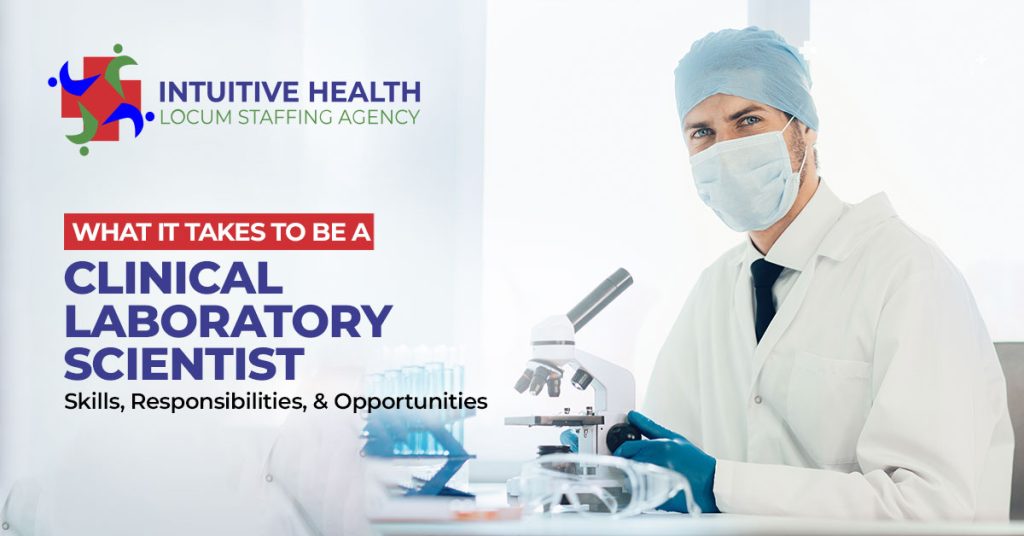Do you ever wonder what happens to blood samples once they leave the collection room?
Once the samples leave the room, clinical lab scientists work behind the scenes, running detailed analyses that give physicians the necessary data needed to diagnose and treat patients. According to studies, nearly 14 billion laboratory tests are conducted annually in the U.S., helping doctors make 70% of medical decisions and highlighting the key role of clinical lab scientists.

The role of clinical lab scientists extends far beyond routine testing. They combine technical expertise with critical thinking to provide accurate results that influence everything from infection detection to cancer monitoring. Healthcare now depends greatly on lab data, so if you’re thinking about becoming a clinical lab scientist, this blog is for you.
Read this full blog to explore the responsibilities, expertise, and career outlook of clinical lab scientists and see why demand for this role keeps rising.
Role of a Clinical Lab Scientist Explained
Ever wondered what happens to a patient’s blood or other testing samples after they’re sent to the lab? These samples are entrusted to clinical lab scientists, who then carefully test and analyze each sample, ensuring accuracy at every step.
Clinical lab scientists’ daily routine often includes testing blood, urine, and tissue to find signs of illness. They help detect infections, monitor chronic conditions, and even identify genetic disorders. By comparing results over time, they also track how well treatments are working.
Another key part of their job is maintaining strict quality control. Without this, test results would lose reliability. In many ways, lab scientists are the safety net that keeps patient care on track.
From detecting disease early to guiding treatment, clinical lab scientists are essential to modern healthcare. Every time a test confirms a diagnosis or rules one out, their work is at the heart of it.
Clinical lab scientists ensure accurate diagnoses, but the healthcare field offers many ways to contribute. Professionals seeking flexible assignments often ask about pay,
Suggested Read: How much does a locum tenens make in California?
7 Key Responsibilities of a Clinical Lab Scientist
Clinical lab scientists perform critical duties from diagnosing conditions to tracking treatment progress, clinical lab scientists make sure results are accurate and timely. Their work combines scientific skill, advanced technology, and collaboration with healthcare teams. Here are seven key responsibilities clinical laboratory scientists handle each day:
1. Running Lab Tests
Clinical lab scientists analyze blood, urine and tissue samples to detect infections, chronic diseases or genetic conditions. Each test provides important clues that help physicians confirm a diagnosis or track how well a treatment is working. Without this step, doctors would be missing the evidence needed for accurate decisions.
2. Operating Advanced Laboratory Equipment
Modern labs rely heavily on technology, and clinical lab scientists are skilled at using it to deliver accurate and timely results. From automated analyzers that run multiple samples simultaneously to microscopes that magnify even minute details, clinical laboratory scientists rely on advanced tools such as these in order to save time and reduce errors while making tests quicker and more precise.
3. Ensuring Accuracy and Reliability of Results
Reliability is at the core of laboratory science. Professionals such as Clinical Lab Scientists in this field adhere to stringent safety measures, sterilization methods and quality checks in order to reduce errors that could impact patient diagnosis – their dedication to precision directly contributes to their dedication of care to keep results accurate.
4. Creating Reliable Reports
After completing the tests, clinical laboratory scientists analyze the data and create reports that help physicians decide whether to prescribe medication, modify a treatment plan, or request additional testing. By providing this information in an understandable format, clinical laboratory scientists enable physicians to act swiftly and confidently.
5. Collaborating With Healthcare Teams
Lab scientists do not work alone; rather they collaborate closely with physicians, nurses, and other specialists to interpret results and provide context. Their contributions allow healthcare teams to form an accurate picture of a patient’s condition for tailored and effective treatment solutions.
6. Organizing Data and Records
Accurate record keeping is just as crucial to medical testing. Clinical laboratory scientists ensure electronic health records, document results and secure patient data are kept safely so medical teams can monitor a patient’s progression over time.
Suggested Read: What is the Role of Clinical Lab Assistant?
7. Learning and Adapting
Healthcare and laboratory science evolve rapidly with advances in technology, diagnostics, and treatment approaches. Clinical lab scientists adapt by pursuing continuing education, renewing certifications, and engaging in hands-on training with new instruments and methods.
They must also stay familiar with evolving safety protocols, regulatory updates, and research discoveries that directly impact testing accuracy. By embracing lifelong learning, they ensure their labs deliver reliable results and maintain a critical role in advancing patient care.
Top 10 Essential Skills Needed to Become a Clinical Lab Scientist
A clinical lab scientist needs a mix of technical expertise and interpersonal abilities. The following ten skills are important for success in modern laboratories and help lab scientists deliver accurate, reliable results while collaborating effectively with healthcare teams.
1. Precision and Attention to Detail
Small errors can severely affect a diagnosis. Precision in sample handling, labeling, and result entry is fundamental to accurate patient care. Clinical lab scientists must handle patient blood samples with extreme care, ensuring accurate labeling, proper storage, and correct entry into records. Precision guarantees that results physicians rely on are trustworthy and error-free.
2. Technical Skills
Modern healthcare depends on technology. Clinical lab scientists need to get hands-on experience with lab instruments like microscopes, PCR machines, analyzers, and automated systems. Strong hands-on skills keep tests accurate, efficient, and on time. It also minimizes errors and delivers consistent results.
3. Commitment to Lab Safety and Quality
Being committed to lab safety and quality is a crucial skill for clinical lab scientists. Maintaining a safe and sterile lab environment protects both professionals and patients. Clinical lab scientists must follow biosafety protocols, wear proper protective equipment, and conduct frequent quality checks. These habits not only maintain accuracy but also uphold patient safety and regulatory standards.
4. Data Analysis & Interpretation
Running a test is only the first step. Clinical lab scientists must interpret raw numbers, recognize abnormal values, and determine their clinical significance. By noticing patterns or trends, they give doctors the insights needed to confirm diagnoses, adjust treatments, or order additional tests.
5. Resolving Lab Challenges
When equipment malfunctions or test results appear inconsistent, clinical lab scientists are the first to act. They troubleshoot by recalibrating machines, checking reagents, or repeating tests. Quick problem-solving skills of clinical lab scientists make sure that delays are avoided and patient care stays on track.
6. Accurate and Timely Reporting
One of the main roles of a clinical lab scientist is making complex results understandable to physicians and nurses quickly. It requires data to be translated into accurate, easy-to-understand summaries without delay. Effective communication ensures that results are interpreted correctly.
Key aspects of strong communication for clinical lab technicians include:
- Clarity: simplifying complex scientific terms so care providers can act quickly.
- Accuracy: avoiding ambiguity or misinterpretation that could alter a diagnosis.
- Timeliness: ensuring results are reported within strict deadlines, especially in emergency cases.
- Collaboration: discussing unusual or critical findings directly with medical teams to provide context.
Clinical lab technologists combine scientific precision with effective communication to bridge the gap between test data and patient care.
7. Teamwork and Interdisciplinary Collaboration
Effective lab work depends on strong collaboration with medical staff across different specialties. Clinical lab scientists often partner with pathologists, clinicians, and nursing staff to give context to test results. Their collaboration helps build integrated care plans where every team member works from the same accurate information.
8. Time Management and Workflow Prioritization
Clinical labs receive hundreds of samples daily, necessitating scientists to work efficiently under pressure. Prioritization between urgent “STAT” tests and routine analyses must take place for effective time management to guarantee quick delivery without compromising accuracy or patient safety.
Effective workflow management also includes:
- Systematic Management: tracking multiple samples, instruments, and reports simultaneously.
- Multitasking: running several assays or machine processes in parallel while monitoring accuracy.
- Efficiency under pressure: staying calm and focused when urgent results and high volumes collide.
- Resource allocation: making sure supplies, reagents, and equipment are available when needed.
Clinical laboratory scientists who master workflow prioritization not only keep labs running smoothly but also ensure physicians and patients receive reliable results when they matter most.
9. Continuous Learning
Laboratory science is advancing beyond traditional testing methods, with new techniques in molecular diagnostics, lab automation, and digital health tools emerging all the time. Clinical lab scientists stay up-to-date through continuing education, certifications, and hands-on training. This ongoing learning allows them to apply cutting-edge methods efficiently while maintaining top performance in the lab
This commitment to learning allows lab technologists to:
- Apply cutting-edge diagnostic techniques accurately and efficiently.
- Adapt to new automated analyzers, PCR platforms, and digital reporting systems.
- Integrate emerging technologies like AI-assisted lab software to improve workflow and reduce errors.
- Maintain high performance and quality standards in an environment where innovation is constant.
10. Maintaining Integrity and Compliance in Clinical Labs
Clinical laboratory technologists are expected to uphold the highest ethical standards in every test they perform. This includes ensuring patient confidentiality, handling sensitive data responsibly, and adhering to professional codes of conduct.
They must also follow strict regulations such as CLIA (Clinical Laboratory Improvement Amendments), CAP (College of American Pathologists) guidelines, and HIPAA. Compliance with these standards make sure that medical test results are accurate, reliable, and legally defensible.
What Roles and Workplaces are Available for Clinical Lab Scientists?
The career path of a clinical lab scientist extends well beyond traditional lab settings. These professionals serve in diverse environments where science meets patient care. Their expertise is needed wherever accurate testing and reliable diagnostics are the backbone of healthcare.
Hospitals and Clinics
Most clinical laboratory scientists work in hospitals and outpatient clinics. Here, they run daily tests that support surgeries, emergency care, and chronic disease management. Without them, physicians would lack the critical data needed for life-saving decisions.
Diagnostic Laboratories
Both private and public diagnostic labs rely heavily on these specialists. Every day, scientists in these settings process thousands of samples; from genetic screening to infectious disease testing, this work touches nearly every aspect of modern medicine.
Research Institutions
Working in research institutions is a valuable career path for clinical laboratory technologists. In these settings, they contribute to developing new diagnostic tests, improving laboratory equipment, and advancing medical knowledge. Their work can lead to innovative treatments, more accurate testing methods, and breakthroughs that directly impact patient care and public health.
Public Health Organizations
Lab scientists also play an essential role in protecting community health. Working for both government and nonprofit labs, their contributions include monitoring disease outbreaks, testing water quality, supporting preventive campaigns and helping protect populations rather than just individual patients.
A trusted healthcare staffing services provider can help lab scientists to find the right locum tenens opportunities.
Where Can a Career in Clinical Laboratory Science Take You?
Clinical lab scientists have a bright future ahead. With healthcare systems depending more on lab testing and an aging population driving demand, the need for skilled professionals continues to rise. According to the U.S. Bureau of Labor Statistics, steady job growth is expected throughout the next decade.
Entry-level positions are widely available in hospitals, diagnostic labs, and research facilities. Salaries tend to range between $60,000 and $95,000 annually. Rural placements may offer additional incentives in order to attract qualified staff.
Experienced lab scientists can look forward to an impressive career advancement. Specialties could include molecular diagnostics, hematology or immunology; others might transition into leadership by overseeing teams or overseeing lab operations.
Find Best Opportunities to Grow as a Clinical Lab Scientist
Clinical lab scientists play a vital role in healthcare. Their work ensures that tests are accurate, treatments are effective, and public role health initiatives are supported. Even though they often work behind the scenes, their contributions directly impact patient care and the overall efficiency of medical facilities.
Clinical lab scientists can explore new opportunities through medical staffing solutions to grow and advance their careers.
A trusted partner for these opportunities is Intuitive Health Services, connecting professionals with hospitals, labs, and research centers. From hospitals and diagnostic labs to research centers and public health organizations, the right placement allows professionals to grow, specialize, and take on leadership roles in their careers.

